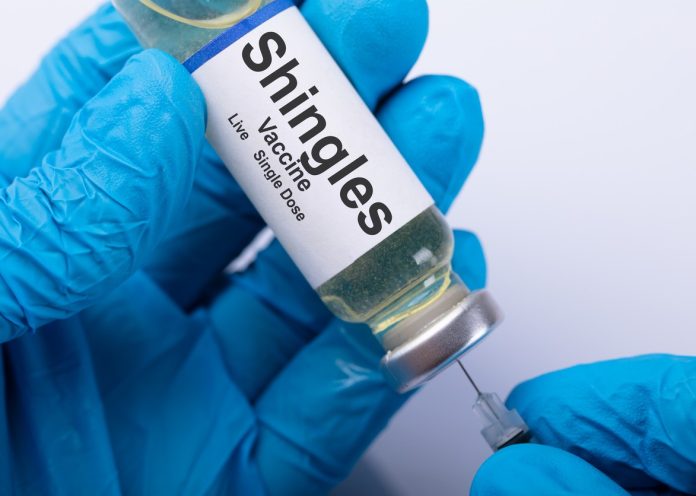Getting the shingles vaccine could lower your risk of a heart attack or stroke by as much as 20%, according to the first study of its kind, which was presented this past weekend at the annual meeting of the European Society of Cardiology in Madrid – the world’s largest cardiology conference.
Shingles, the common condition affecting millions worldwide that causes a painful rash, can lead to serious problems such as deafness, long-lasting pain and blindness. It is more likely to cause serious problems in older people, reports The Guardian.
Most countries tend to recommend the vaccine only to older people or immunosuppressed adults but the findings suggest it could have cardiovascular protective effects in adults as young as 18.
The results from the study, the world’s first global systematic review and meta analysis, shows the jab is associated with a significant lower risk of cardiovascular events.
Having the shingles jab was associated with an 18% lower risk of stroke or heart attack in adults 18 and above, while there was a 16% reduction in risk of cardiovascular events in people who were 50 or older.
Dr Charles Williams, the study’s author and global associate medical director at GSK, said: “We looked at the currently available evidence, and found that in this analysis, vaccination against herpes zoster was associated with a lower risk of cardiovascular events – like heart attacks or strokes.
“Further research studies are now needed to find out whether this association can be attributed to an effect of herpes zoster vaccination.”
The global systematic review was conducted using three scientific literature databases, and a meta analysis was conducted of phase 3 randomised controlled trials and observational studies assessing the effect of herpes zoster vaccination on cardiovascular events.
The shingles jab is usually just taken once, and is typically administered in two doses, several months apart.
In total, 19 studies were included in the review. Eight observational studies and one randomised controlled trial met the inclusion criteria for studying the impact of the jab on cardiovascular events.
Vaccination is increasingly being seen as an effective measure not only against specific infections, but also for the prevention of CVD or events.
Professor Filippo Crea, from the Catholic University in Rome, who was not involved with the study, said: “These results support a growing body of evidence … which indicates that vaccinations reduce the risk of cardiovascular disease.”
Professor Bryan Williams, Chief Scientific and Medical Officer at the British Heart Foundation, also not involved with the research, welcomed the findings but said further research was needed.
“There is great interest in studies suggesting the shingles vaccine may reduce the risk of cardiovascular events, although this analysis is largely based on observational studies, which cannot demonstrate cause and effect.
“We know that shingles can cause inflammation in the body, and a culprit in many heart and circulatory conditions that can lead to heart attacks and strokes.
“By preventing shingles, vaccination could therefore be protective. But far more research is needed, especially to understand the intriguing results in younger people. More evidence will be needed before the vaccine can be recommended for a wider age group.”
The findings came as NHS England said 300 000 more people would become eligible for the shingles jab from this week.
People eligible from 1 September are those between 18 and 49 with a severely weakened immune system. The NHS previously expanded eligibility to include people over 50 with a severely weakened immune system.
Study details
Herpes zoster vaccine effectiveness against cardiovascular events – a systematic literature review and meta-analysis
C Williams, DL Bhatt, C Aguiar, TYC Nguyen, E Antoniou, R Parikh.
Presented at the ESC Congress on 30 August 2025
Abstract
Background
Numerous studies have indicated an increased risk of stroke and myocardial infarction (MI) following herpes zoster (HZ); however, the impact of vaccination remains uncertain.
Purpose
To assess HZ vaccination effectiveness with recombinant zoster vaccine (RZV) or zoster vaccine live-attenuated (ZVL), against cardiovascular (CV) events (stroke, MI, or CV death) in adults aged ≥18 years and ≥50 years.
Methods
A global systematic literature review (Medline, Embase, Lilacs; 2004–2024) and meta-analysis were conducted of phase 3 randomised controlled trials (RCTs) and observational studies assessing the effect of HZ vaccination on CV events. Meta-analysis inclusion criteria followed Cochrane guidelines. Heterogeneity of included studies was examined by the I 2 index. Pooled risk ratio (RR) and 95% confidence interval (CI) were estimated with random-effects models.
Results
A total of 19 studies were included in the review; eight observational studies and one RCT met the meta-analysis inclusion criteria for HZ vaccination effectiveness on CV events. Across all nine studies, 53.32% of participants were male. Seven studies reported mean ages from 53.6 years to 74.0 years. No studies assessed CV deaths. Any HZ vaccination (RZV or ZVL) was associated with a significantly lower risk of stroke and MI, versus no HZ vaccination: pooled RR of 0.82 (95% CI 0.76–0.87) in adults ≥18 years and RR of 0.84 (0.82–0.87) in adults ≥50 years. Thus, vaccine effectiveness was 18% (13–24%) and 16% (13–18%) in preventing CV events, respectively. RZV vaccination was associated with a significantly lower risk of stroke and MI versus no HZ vaccination: pooled RR 0.79 (0.65–0.97) in adults ≥18 years and RR 0.79 (0.64–0.97) in adults ≥50 years, with a vaccine effectiveness of 21% (3–35%) and 21% (3–36%), respectively.
Conclusions
HZ vaccination (ZVL or RZV) was associated with a significantly lower rate of CV events. The potential cardio-protective effect of HZ vaccination could help to further reduce disease burden in adults, warranting further research.
See more from MedicalBrief archives:
RSV and shingles jabs tied to lower dementia risk – Oxford analysis
Contracting shingles doubles stroke and heart attack risk
Shingles jab may help ward off dementia – UK study
Shingles and statins findings a ‘significant’ boost in dementia fight

